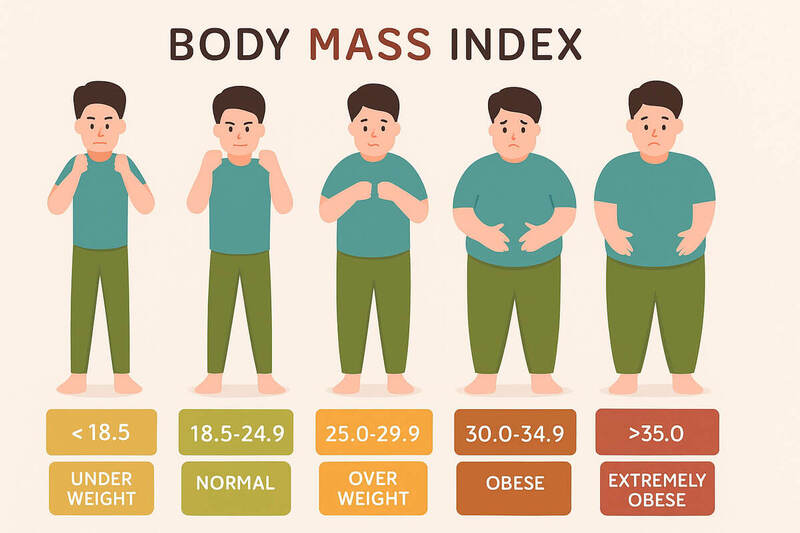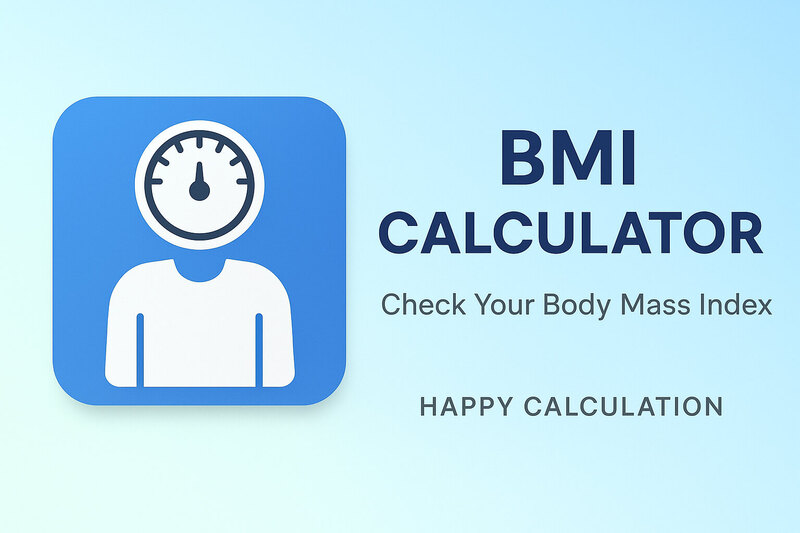BMI CALCULATOR
calculate your body mass index instantly
CALCULATE MY BMI
Calculate your Body Mass Index accurately
YOUR BMI
BMI is a screening tool, not a direct measure of body fat or health.
OBESITY RISK CHECKER
Assess your obesity risk factors
OBESITY RISK ASSESSMENT
Your BMI: -
BMI Risk
-
Waist Risk
-
Lifestyle Factors
-
Recommendations
-
RELATED TOOLS
OTHERS
TRY MORE CALCULATORS
HEALTH & WELLNESS BLOG
Free Online BMI Calculator – Check Your Body Mass Index Instantly
The BMI Calculator (Body Mass Index Calculator) helps you find out if your weight is healthy for your height. It’s a simple online tool that gives instant results for men, women, and children. Knowing your BMI is the first step toward understanding your health and fitness goals.
What is BMI?
BMI stands for Body Mass Index. It is a number calculated using your height and weight to determine whether you are underweight, healthy, overweight, or obese. BMI is a global health standard used by doctors and fitness experts to assess body fat levels.
BMI Chart

BMI Categories Explained
| BMI Range | Category |
|---|---|
| Below 18.5 | Underweight |
| 18.5 – 24.9 | Healthy Weight |
| 25 – 29.9 | Overweight |
| 30 – 34.9 | Obese (Class I) |
| 35 – 39.9 | Obese (Class II) |
| ≥ 40 | Obese (Class III / Morbid) |
BMI Formula
Healthy(Normal) Range Of BMI
The healthy normal range of bmi for men, women and kids lies from 18.9 to 24.9
How to Use the BMI Calculator
- Enter your height (in cm, feet, or inches).
- Enter your weight (in kg or pounds).
- Click on the “Calculate BMI” button.
- Your BMI score and category (Underweight, Normal, Overweight, or Obese) will appear instantly.
Why Knowing Your BMI is Important
Understanding your BMI helps you stay aware of potential health risks related to your body weight. Maintaining a healthy BMI can lower your chances of diseases like heart problems, diabetes, and high blood pressure. A healthy lifestyle with proper diet and exercise can help you achieve a normal BMI range.
What To Do With My BMI Result
Underweight (BMI below 18.5)
What it means: You may be undernourished or not getting enough calories, protein, or essential nutrients. Eat nutrient-rich, high-calorie foods like nuts, avocados, eggs, milk, and whole grains. Add healthy snacks between meals. Focus on strength-building exercises to increase muscle mass. Consult a doctor or dietitian to rule out underlying health issues.
Normal Weight (BMI 18.5 – 24.9)
What it means: Your weight is in a healthy range for your height. Maintain a balanced diet with fruits, vegetables, proteins, and whole grains. Exercise at least 30 minutes daily (walking, jogging, yoga, etc.). Get regular health checkups to stay on track. Keep monitoring your BMI every few months.
Overweight (BMI 25 – 29.9)
What it means: You may be carrying extra body fat that can increase your risk for heart disease, diabetes, and other conditions. Focus on portion control and reduce processed or sugary foods. Exercise regularly — aim for at least 150 minutes of physical activity per week. Drink plenty of water and get enough sleep. Track progress with weight logs and small, realistic goals.
Healthy Ways To Improve Your BMI
Eat Balanced Diet
Include a mix of fruits, vegetables, lean proteins, whole grains, and healthy fats. Avoid skipping meals and try to eat at regular times to maintain energy and metabolism.
Stay Hydrated
Drink at least 6–8 glasses of water daily. Staying hydrated helps control appetite, improves digestion, and supports fat metabolism.
Exercise Regularly
Engage in at least 150 minutes of moderate physical activity per week — like walking, cycling, or swimming. Add some strength training to build lean muscle, which helps burn calories even at rest.
Get Enough Sleep
Poor sleep can disrupt hormones that control hunger and weight. Aim for 7–8 hours of quality sleep every night to help maintain a healthy BMI.
Manage Stress
Stress can lead to overeating or unhealthy habits. Try meditation, yoga, or deep breathing exercises to keep your mind and body balanced.
Seek Professional Advice
If your BMI is too low or too high, consult a doctor or dietitian for personalized guidance. They can help you create a healthy plan based on your body type, age, and activity level.
Limitations Of BMI
BMI is a simple screening tool, not a diagnostic measure.It’s useful for large populations but not always accurate for individuals.
1. Doesn’t Differentiate Between Fat and Muscle
2. Doesn’t Show Fat Distribution
3. Not Suitable for All Age Groups Equally
4. Doesn’t Consider Ethnic Differences
5. Doesn’t Indicate Overall Health
Relationship With Health
A study published by Journal of the American Medical Association (JAMA) in 2005 showed that overweight people had a death rate similar to normal weight people as defined by BMI, while underweight and obese people had a higher death rate.
A study published by The Lancet in 2009 involving 900,000 adults showed that overweight and underweight people both had a mortality rate higher than normal weight people as defined by BMI. The optimal BMI was found to be in the range of 22.5–25. The average BMI of athletes is 22.4 for women and 23.6 for men.
High BMI is associated with type 2 diabetes only in people with high serum gamma-glutamyl transpeptidase.
Diseases With Overweight
artery disease
Dyslipidemia
Type 2 diabetes
Gallbladder disease
Hypertension
Osteoarthritis
Sleep apnea
Stroke
Infertility
At least 10 cancers, including endometrial, breast, and colon cancer
Epidural lipomatosis
Frequently Asked Questions (FAQs)
What is a healthy BMI for adults?
A healthy BMI for adults falls between 18.5 and 24.9.
How to interpret my BMI score for health?
If u are fat and your height is short than first focus on weight loss and try to increase your height.
How to calculate bmi simple formula?
The formula is BMI = kg/m2
Is a BMI of 27 healthy or overweight?
Yes it comes in overweight.The healthy bmi fall 18.5 to 24.9
Is BMI accurate for everyone?
BMI gives a general idea but may not perfectly reflect body composition for athletes or pregnant women.
Can I use this BMI calculator for kids?
Yes, but for children, BMI interpretation differs based on age and gender.
Does BMI change with age?
Yes, BMI can change as your body composition and metabolism shift with age.
What is ideal weight for my height?
If your height is from 155 to 165 than your ideal weight will be 50 to 65. If your height is from 165 to 175 than your ideal weight will be 65 to 80
How can I improve my BMI?
Regular exercise, balanced diet, and portion control can help you reach a healthier BMI range.

How to calculate BMI accurately for women over 40?
Calculating BMI for women over 40 requires understanding how body composition changes with age. As metabolism slows and hormonal changes affect weight distribution, BMI calculations should be interpreted with consideration of these factors.
What is a healthy BMI range for men with muscle mass?
For muscular men, standard BMI calculations may inaccurately categorize them as overweight. Since muscle weighs more than fat, athletes and bodybuilders often have higher BMI values despite having low body fat percentages.
How does BMI calculation differ for children and teenagers?
BMI calculations for children and teens account for age and gender differences in growth patterns. Pediatric BMI is expressed as a percentile relative to others of the same age and sex, rather than using the standard categories for adults.
Can BMI be inaccurate for Asian populations?
Research shows that Asian populations may have higher health risks at lower BMI levels compared to Caucasians. Some health organizations recommend different BMI cutoff points for Asian individuals to account for these differences.